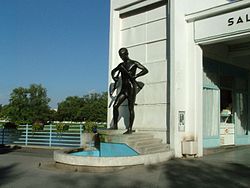Balneotherapy
| Balneotherapy | |
|---|---|
 Roman Baths in Bath Spa, England July 2006 | |
| MeSH | D001452 |
| Part of a series on |
| Alternative medicine |
|---|
 |
Balneotherapy (Latin: balneum "bath") is a method of treating diseases by bathing, a traditional medicine technique usually practiced at spas.[1] Since ancient times, humans have used hot springs, public baths and thermal medicine for therapeutic effects.[2] While it is considered distinct from hydrotherapy,[3] there are some overlaps in practice and in underlying principles. Balneotherapy may involve hot or cold water, massage through moving water, relaxation, or stimulation. Many mineral waters at spas are rich in particular minerals such as silica, sulfur, selenium, and radium. Medicinal clays are also widely used, a practice known as 'fangotherapy'.
Definition and characteristics
[edit]
"Balneotherapy" is the practice of immersing a subject in mineral water or mineral-laden mud; it is part of the traditional medicine of many cultures and originated in hot springs, cold water springs, or other sources of such water, like the Dead Sea.[4]
Presumed effect on diseases
[edit]
Balneotherapy may be recommended for various illnesses, including arthritis,[5] skin conditions and fibromyalgia.[6] Balneotherapy should be discussed in advance with a physician before beginning treatment since several conditions, like heart disease and pregnancy, can result in a serious adverse effect.
Scientific studies into the effectiveness of balneotherapy do not show that balneotherapy is effective for treating rheumatoid arthritis.[7] There is also no evidence indicating a more effective type of bath,[7] or that bathing is more effective than exercise, relaxation therapy, or mudpacks.[7] Most of the studies on balneotherapy have methodological flaws and are not reliable.[8][7] A 2009 review of all published clinical evidence concluded that existing research is not sufficiently strong to draw firm conclusions about the efficacy of balneotherapy.[9]
"Balneophototherapy" combines salt bathing (balneotherapy) and exposure to ultraviolet B-light (UVB) as a potential treatment for severe, chronic plaque psoriasis. A Cochrane review found low-quality evidence that salt bathing combined with UVB may relieve psoriasis severity compared to UVB treatment only.[10]
A 2018 systematic review concluded that "balneotherapy and spa therapy may be considered useful interventions for managing stress conditions".[11]
See also
[edit]- Boleslav Vladimirovich Likhterman
- Enoch Heinrich Kisch
- Destination spa
- Hot spring
- Hydrotherapy
- Mineral spa
- Onsen
- Peloid
- Thalassotherapy
References
[edit]- ^ Angus Stevenson, ed. (2007). "Definition of balneo therapy". Shorter Oxford English Dictionary. Vol. 1: A-M (6th ed.). Oxford: Oxford University Press. p. 180. ISBN 978-0-19-920687-2.
- ^ Melillo, L. (1995). "Thermalism in the ancient world". Med Secoli. 7 (3): 461–483. PMID 11623481. Retrieved 15 June 2022.
- ^ Chisholm 1911.
- ^ Matz, H; Orion, E; Wolf, R (2003). "Balneotherapy in dermatology". Dermatologic Therapy. 16 (2): 132–40. doi:10.1046/j.1529-8019.2003.01622.x. PMID 12919115. S2CID 27602504.
- ^ Sukenik S; Flusser, D; Codish, S; Abu-Shakra, M (1999). "Balneotherapy at the Dead Sea area for knee osteoarthritis". IMAJ. 1 (2): 83–85. PMID 10731301.
- ^ Deniz Evcik; Kizilay, B; Gökçen, E (June 2002). "The effects of balneotherapy on fibromyalgia patients". Rheumatology International. 22 (2): 56–59. doi:10.1007/s00296-002-0189-8. PMID 12070676. S2CID 40868870.
- ^ a b c d Verhagen, Arianne P.; Bierma-Zeinstra, Sita M. A.; Boers, Maarten; Cardoso, Jefferson R.; Lambeck, Johan; de Bie, Rob; de Vet, Henrica C. W. (11 April 2015). "Balneotherapy (or spa therapy) for rheumatoid arthritis". The Cochrane Database of Systematic Reviews. 2015 (4): CD000518. doi:10.1002/14651858.CD000518.pub2. ISSN 1469-493X. PMC 7045434. PMID 25862243.
- ^ Verhagen AP; De Vet, HC; De Bie, RA; Kessels, AG; Boers, M; Knipschild, PG (October 1997). "Taking baths: the efficacy of balneotherapy in patients with arthritis. A systematic review". J Rheumatol. 24 (10): 1964–71. PMID 9330940.
- ^ Falagas ME; et al. (2009). "The therapeutic effect of balneotherapy: Evaluation of the evidence from randomized controlled trials". International Journal of Clinical Practice. 63 (7): 1068–84. doi:10.1111/j.1742-1241.2009.02062.x. PMID 19570124. S2CID 26008531.
- ^ Peinemann F, Harari M, Peternel S, Chan T, Chan D, Labeit AM, Gambichler T. (May 2020). "Indoor salt water baths followed by artificial ultraviolet B light for chronic plaque psoriasis". The Cochrane Database of Systematic Reviews. 2020 (5): CD011941. doi:10.1002/14651858.CD011941.pub2. PMC 7199317. PMID 32368795.
{{cite journal}}: CS1 maint: multiple names: authors list (link) - ^ Antonelli, Michelle; Donelli, David (2018). "Effects of balneotherapy and spa therapy on levels of cortisol as a stress biomarker: a systematic review". International Journal of Biometeorology. 62 (6).
Further reading
[edit]- Nathaniel Altman, Healing springs: the ultimate guide to taking the waters : from hidden springs to the world's greatest spas. Inner Traditions / Bear & Company, 2000. ISBN 0-89281-836-0
- James Crook, The Mineral Waters of the United States and their Therapeutic Uses, Lea Brothers & Co., New York and Philadelphia, 1899.
- Dian Dincin Buchman, The complete book of water healing. 2nd ed., McGraw-Hill Professional, 2001. ISBN 0-658-01378-5
- Jane Crebbin-Bailey, John W. Harcup, John Harrington, The Spa Book: The Official Guide to Spa Therapy. Publisher: Cengage Learning EMEA, 2005. ISBN 1-86152-917-1
- Chisholm, Hugh, ed. (1911). . Encyclopædia Britannica. Vol. 3 (11th ed.). Cambridge University Press. pp. 284–285.
- Esti Dvorjetski, Leisure, pleasure, and healing: spa culture and medicine in ancient eastern Mediterranean., E. J. Brill, 2007 (illustrated). ISBN 90-04-15681-X
- Carola Koenig, Specialized Hydro-, Balneo-and Medicinal Bath Therapy. Publisher: iUniverse, 2005. ISBN 0-595-36508-6
- Anne Williams, Spa bodywork: a guide for massage therapists. Lippincott Williams & Wilkins, 2006. ISBN 0-7817-5578-6
